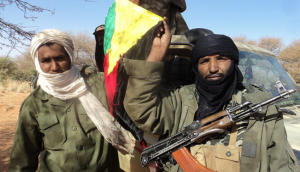
This year, Muslims, both Shiites and Sunnis, have a lot to reflect upon and reasons to ask Allah for forgiveness of sins. After all, since the last Hajj, there have been many events in the region and in the world that culminated in a radical change in the general climate in the Middle East this past September.
The problem of eliminating the arsenal of chemical weapons in Damascus, discussed between Putin and Obama in complete secrecy for almost a year (since the G-20 summit in Los Cabos, which was announced by the authoritative French magazine Le Monde Diplomatique in its October 2013 issue, making reference to anonymous advisers of the White House) has led to serious agreements between the Russian and American presidents during their meeting in St. Petersburg on September 5, and as a result, to a “reshuffling” not only between the participants of the recent bloodiest conflict in the region but globally, as well. The Middle East has confirmed once again that world politics happens there, and, sometimes, at its expense.
The recent growing strain in international relations, which threatened a serious, or even global armed conflict, was successfully resolved and led to a multilayer compromise, which redrew the previous balance.
If we talk about the redistribution of forces and power at the global level, it is clear in whose favor this was made, judging by the resolution 2118 of the UN Security Council adopted on September 27 on international control over the Syrian arsenal. Of course, this is Russia, the “capitalization” of which has sharply increased on the world political stage. Beijing has also seriously increased its value, without causing much damage to itself on other fronts, it backed the political compromise on Syria in the Security Council, and (unlike Russia) retained sufficient trust relationship with the Sunni monarchies of the Persian Gulf, from which it imports increasing volumes of oil, gradually becoming the major trading partner of this region, instead of the weakening U.S.A.
This balance has much more nuances for Washington. The critics of the current host of the White House believe that the United States, agreeing to this deal, lost more than it earned. Yes, tactically they played into the hands of their chief ally, Israel, pulling out the “chemical tooth” of its main enemy. However, at the same time, they virtually recognized the return of Russia to the region as a world power (the position that Gorbachev “surrendered” to the elder George Bush during their meeting in Malta in 1989, at least it has always been considered like this in the Middle East), and as one of the major players in its vastness. In this case, Barack Obama was able to “save face” and formally fulfill the promise, given in 2012, to decisively respond to Bashar al-Assad’s use of chemical weapons. In this case, it is clear to all impartial observers that chemical weapons had not been applied by the regime, but by its opponents, having the goal of attracting the United States into the conflict on their side. With Russia’s help, the American president successfully escaped from this war, for the interests of others, and it can also be put to his credit, as well as to that of the United States as a whole, which for the first time in a long time, in the Middle East behaved as a responsible power.
Looking at it more globally, the United States made a strategic maneuver, allowing the growing influence of Moscow in the region (and, judging by the starting dialogue with Iran, that of Tehran in the future, as well) to focus on rebalancing its ties with the ASEAN area, where they are faced with the increasing activity of China. Yet, nevertheless, their resources are still not sufficient.
Germany, which from the beginning was skeptical about the prospects of the military scenario and, in fact, never backed it, looks rather confident.
The Middle East policy of France turned out to be an ignominious failure. Since the beginning of the “Arab Spring” it was Paris, which during the Sarkozy’s rule, that acted as the “godfather” of Arab revolutions, sponsored them in every possible way, making it the philosophical and political base for the needed victory of freedom and democracy everywhere from Morocco to Iraq, assisting in every way the overthrow and killing of Gaddafi, unconditionally supporting the most radical opposition to al-Assad’s regime. During the time of F. Ollande, Paris expected to maintain its place as one of the first world powers. The relatively easy victory over the jihadists in Mali, in early 2013, contributed to it as well. The French managed to get away from there, having the support of their “big brother”, who on April 25, 2013 lobbied the adoption of a UN Security Council Resolution to replace the French contingent (it was already being disguised as a contingent of ECOWAS countries) by an international force.
The September shower turned out to be quite cool for Mr. Ollande. Neither Obama nor Vladimir Putin shared their plans with him or involved him in the liquidation of chemical weapons, while the Elysee Palace learned too late about the abolition of U.S. military action against Syria, in which, as they gossip in the international media, the French were going to take an active part, and they had to cancel their military orders. Even if it is not so, and the military contracts worth billions of dollars, signed with the Saudi monarchy during the recent visit of the French Minister of Defense Le Drian in Jeddah, may, of course, comfort Paris, it is already clear: in the Middle East France moved from the “heavyweight” category, to that of “featherweight”, the term which is used to call boxers of lower weight class.
(To be continued)
Poghos Anastasov, political scientist, orientalist, especially for the online magazine New Eastern Outlook.
